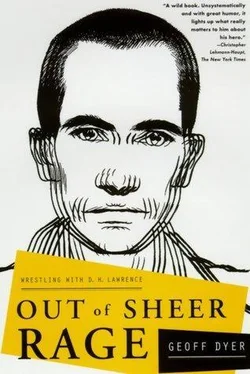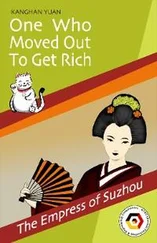When Laura came back from her assignment we spent our afternoons under that sky, sunbathing on the roof, and our evenings hanging out at the Calisto. I had a few articles to write, simple things, but time-consuming enough to make me lose what little momentum I had built up on my study of Lawrence. It was because these articles were so simple, in fact, that I stalled on the Lawrence book. What was the point flogging my guts out writing a study of Lawrence that no one would want to read when I could bang out articles that paid extremely well and took only a fraction of the effort? Especially since Lawrence himself felt the same way: ‘I feel I never want to write another book. What’s the good! I can eke out a living on stories and little articles, that don’t cost a tithe of the output a book costs. Why write novels any more!’ He expressed similar sentiments on numerous occasions; at one point he reckoned he was losing his ‘will to write altogether’, meaning, on this occasion, that he no longer even felt like writing letters. I was so heartened by this that my interest in writing about Lawrence revived to the extent that I started in on Rilke’s letters again. By now, I had persuaded myself, reading Rilke was part and parcel of working on my study of Lawrence. ‘ Il faut travailler, rien que travailler. ’ It was a shame, Rilke thought, that we had so many seductive memories of idleness; if only we had ‘work-memories’ then perhaps, without recourse to compulsion or discipline, it would be possible to find ‘natural contentment’ in work, in ‘that one thing which nothing else touches’. The worst thing, for Rilke, was that he had these two kinds of memory, both these impulses, in himself: a longing, on the one hand, to devote himself to art and, on the other, to set up a simple shop with ‘no thought for the morrow’. Laura’s version of this normal life was — and still is — to run a pensione . She had mentioned it in Taormina and several times since coming back she had talked about the pride she would take in keeping it clean. My version of this was to live in England and watch telly. The ideal situation for us both would have been to have watched a series about an Italian pensione on telly. Rilke did more or less the same thing, reconciling these impulses by making his vision of contentment the subject of a poem, ‘Evening Meal’. More broadly, this tension between life and work remained one of the dominant preoccupations of his life — and work. ‘Either happiness or art,’ he declared, struggling to assimilate the example of Rodin. ‘All the great men have let their lives get overgrown like an old path and have carried everything into their art. Their life is stunted like an organ they no longer use.’ Yeats offered the same choice: perfection of the man or the work.
For some writers there has scarcely been any friction between the demands of the life and the demands of the work. John Updike arranged his circumstances to his liking fairly early on and then simply got on with his writing, book after book, day after day. At the opposite extreme there was John Berger who only managed such extreme changes in his writing by corresponding changes in how and where he lived. For Rilke, too, the real work was to organise his existence, to will himself a life that would create the ideal conditions in which to work. Allowing life to atrophy so that he might work was itself a way of enhancing his life — even though the demands this made on his life, on his life-capacity, were immense and unremitting. To make things he had constantly to re-make himself: ‘ Du mußt dein Leben ändern ’ (‘i.e. find a different princess to live off’ was Larkin’s sardonic gloss).
And to what end, this subordination of life to work? There may be an ‘ancient enmity between our daily life and the great work’ but this relationship is more fluid, more complex, than the aphoristic formula from ‘Requiem for a Friend’ allows. ‘For one human being to love another human being: that,’ Rilke conceded, ‘is perhaps the most difficult task that has been given to us, the ultimate final problem and proof, the work for which all other work is merely preparation.’
Lawrence was untroubled by any of this. All the work of his maturity was built on his relationship with Frieda. ‘Fidelity to oneself means fidelity single and unchanging, to one other one.’ His adult life begins with the unalterable fact of his marriage. As for work, he wrote when he felt like it, didn’t when he didn’t. Idleness seems to have held no attraction for him as a seductive ideal: the division between work and rest seems to have been as natural as that between sleeping and waking. Writing the novels took an enormous toll, obviously, but to Lawrence, the miner’s son who had grown up amidst the ravages of gruelling physical labour, living by his pen was not such a bad option. He spent no time agonising over the rival claims of work and life because the two were inextricably bound together. ‘I don’t sacrifice myself for anything but I do devote myself to something.’ And to what did he devote himself? To writing? No. To living (‘not the work I shall produce, but the real Me I shall achieve, that is the consideration’). To say this is to reiterate one of the most hackneyed aspects of the Lawrence myth but it is difficult to improve upon, or at least his own version of it is: ‘I don’t think that to work is to live. Work is all right in proportion: but one wants to have a certain richness and satisfaction in oneself, which is more than anything produced. One wants to be .’
That was all very well but I had no richness and satisfaction in myself, more like a poverty and dissatisfaction. I had made progress on my study, that is, I had made progress in my mental preparation but now I had stalled. My lassitude was irritating me a good deal and this meant that Rome irritated me a good deal too. There had been several mornings when the Caffè Farnese had not had the cornetti integrali that I depended on for my breakfast. Without these integrali — more accurately with the disappointment of not having had my integrali — I found it difficult to get started on my work. I sulked, I went on a tacit strike as a protest against the Farnese and its undependable supply of integrali . I picked up books and put them down, thought about doing some writing and then did the washing-up instead. I recognised all these signs of unfocused anxiety and began to wonder if it might not be a good idea to move somewhere else to write my study of Lawrence. Laura’s apartment should have been the perfect place to work but I couldn’t get any work done there. I recognised that feeling too. Over the years I had come across several places that offered the ideal conditions to work. The room in Montepulciano, for example, with the lovely wooden bed and white sheets, the window gazing out over the Tuscan countryside, the terrace formed by what had once been a little bridge connecting our building to the one next door. Or the house in Lauzun with the room overlooking a field of wheat, facing west so that in the evenings the paper on the desk was bathed red. Or my apartment on Rue Popincourt with the floor-to-ceiling window from which you could see right down Rue de la Roquette, as far as the Bastille almost.
What they all had in common, these ideal places for working, was that I never got any work done in them. I would sit down at my desk and think to myself What perfect conditions for working, then I would look out at the sun smouldering over the wheat, or at the trees gathering the Tuscan light around themselves, or at the Parisians walking through the twilight and traffic of Rue de la Roquette, and I would write a few lines like ‘If I look up from my desk I can see the sun smouldering over the wheat’; or ‘Through my window: crowded twilight on the Rue de la Roquette’; and then, in order to make sure that what I was writing was capturing exactly the moment and mood, I would look up again at the sun smouldering over the flame-red wheat or the crowds moving through the neon twilight of Rue de la Roquette and add a few more words like ‘flame-red’ or ‘neon’, and then, in order to give myself over totally to the scene, would lay down my pen and simply gaze out at the scene, thinking that it was actually a waste to sit here writing when I could be looking and by looking — especially on Rue de la Roquette where the pedestrians hurrying home in the neon twilight would look up and see a figure at his desk, bathed in the yellow light of the anglepoise — actually become a part of the scene, whereas writing involved not an immersion in the actual scene but its opposite, a detachment from it. After a very short time I would grow bored by contemplating the scene, would leave my desk and go for a walk in the wheatfield sunset or leave my apartment and walk down to the Bastille so that I could become one of the people walking back through the neon twilight of the Rue de la Roquette, looking up at the empty desk, bathed in the light of the anglepoise. .
Читать дальше












